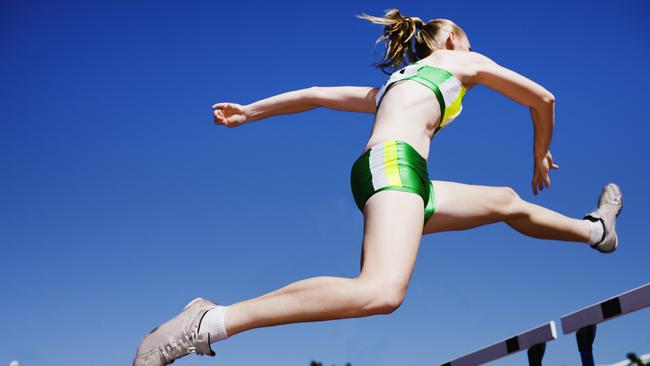The big hurdles to clear before 2032 Brisbane Olympics
Greater support for junior sport was needed to ensure Australia’s success at the 2032 Brisbane Olympics, a gathering of top sports administrators told a BDO/QBW lunch.
QBW
Don't miss out on the headlines from QBW. Followed categories will be added to My News.
The 2032 Brisbane Olympics could be a “disaster” for Australia if the country did not accelerate support of grassroots junior sport.
The warning from University of Queensland human movement professor Cliff Mallett was backed by veteran rugby league coach Wayne Bennett at a BDO/Queensland Business Weekly lunch attended by top sporting administrators.
Professor Mallett said the divisions between club and school sport had to be broken down if Australia was to build successful athletes and teams in the lead up to 2032.
“There are these silos in sport between clubs and schools,” said Prof Mallett. “In Australia, everyone has their own piece of turf. We need to get the community back into sport. If things do not improve, 2032 could be a disaster.”
Mr Bennett said there was a need for governments to give more support to school sporting programs. He said was concerned there was a lack of resilience developing in young people, which did not bode well for our sporting performance at elite levels.
“We really are living in a society that is a lot softer and the kids these days are not as resilient as they were in the past,” said Mr Bennett. “You have to be tough in sport.”
He said the importance of sport in the development of young people had been underscored during Covid-19 when many competitions had been shut down. He said young people needed commitment to succeed in sport as well as a work ethic.
BDO associate director William Tuffley said it was important to continue development of higher performance sporting infrastructure which facilitate multiple sports and support local businesses and help foster community engagement.
“Strategically aligning the wealthier sports which already use high performance infrastructure with lower profile sports is critical to overall success,” said Mr Tuffley, who is part of BDO’s specialised sports division.

He said it would be important to build these sporting hubs in areas outside of South East Queensland.
“(This) will not only provide access to high performance facilities for talented country kids but also provide tourism opportunities for international athletes and countries looking to base themselves in Australia in preparation for 2032,” he said.
Queensland Academy of Sport chief executive Chelsea Warr said that while 2032 may be a decade away, the time would go very fast. “We really only have until 2028,” said Ms Warr. “By then, we will have to have hundreds and hundreds of athletes ready in the top 10 per cent of performers. We are really talking about identifying nine-year-old skateboarders now.”
The Federal Government invested $135 million into high-performance sport in the six years leading up to Sydney 2000, which is where Australia received its highest ever medal tally, winning 58 throughout the games.
Queensland Rugby League chairman Bruce Hatcher said participation had dropped off at junior sport level partly because sporting organisations feared the risk of being sued if someone was injured. “Teachers and coaches are more reluctant to make themselves available because of that,” said Mr Hatcher. “There is a need by governments to provide sporting groups with more protections in this regard.”
Statistics from AusPlay, a national population tracking survey, reveals the number of young people taking part in organised sport over the past 18 months has declined.
Children playing sport outside of school went from 55 per cent to 43 per cent last year largely due to the restrictions placed on community gatherings.

The vast majority of children’s organised outside of school participation is through club sport, which was restricted during the pandemic.
St Joseph’s College Gregory Terrace principal Michael Carroll said the importance of social interaction in sport could not be underestimated. “Our students really missed the spectators at sporting events during the pandemic, but thankfully we are now returning to normal,” he said.
He said the Olympics would provide role models for young people but stressed not everyone could be elite athletes. “Participation is the key,” said Mr Carroll.
Queensland Academy of Sport’s Warr said Covid-19 shutdowns had resulted in some surprising benefits for athletes in the lead up to the Tokyo games earlier this year.
“There was a shift to online training with a lot of time spent in the Covid-19 bubble,” said Ms Warr. “People were initially concerned because athletes were not going to as many competitions but there was a lot of deliberate practice and that helped focus people. “
Golf Queensland chair David Brett said golf was one sport that had done very well during Covid-19 with participation rates up 45 per cent. “It was one of the few sports that was able to be played during the lockdowns,” said Mr Brett. He said the growing diversity of the sport meant some of the traditional “stuffiness” around golf had dissipated.
Tri Nation Triathlon head coach and owner Tim Franklin said the 2032 games would be a boon for lower profile sports such as mountain biking, skateboarding and fencing because it would mean there would be more investment in infrastructure. “It will be one of the greatest things ever to happen in Brisbane,” he said.





